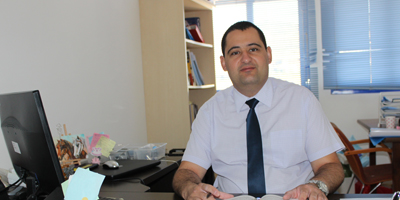Head of Civil Engineering Department of European University of Lefke (EUL) Assoc. Dr. Ertuğ Aydın discussed the use of waste materials in cement production in his study

Aydın: During the production of 1 ton cement, approximately 1 ton of carbon dioxide gas is emitted into the atmosphere.
“In today’s world where global warming is felt to a great extent, problems caused by climate changes continue to increase day by day. The reason for this is actually cement, which is a component of concrete used in the construction industry. During the production of 1 ton of cement, approximately 1 ton of carbon dioxide gas is emitted into the atmosphere and creates serious environmental problems. ”Aydın stated that this amount can actually be reduced by utilizing industrial wastes.
Aydın, who said that if marble powder, one of the widely used industrial wastes, is used as a concrete component, will decrease the amount of carbon dioxide significantly, Aydın added that this contribution can be made to the sustainable concrete sector. Aydın stated that the composites prepared in the European University of Lefke Civil Engineering Laboratory are environmentally friendly and economical and meet the current standards required for building material production. Aydın stated that “by reducing the high amount of cement in the composites designed as cement paste in the laboratory and adding the marble waste obtained from Levent Stonite company instead, it produces composites with a 28-day strength varying between 17-30 MPa, and uses approximately 60% of waste marble dust in these composites. He pointed out that a significant decrease in the amount and the waste was used in some way.
Aydın: Industrial wastes should be used especially in the construction sector
Aydın said that waste utilization actually started in the 1990s, but the amount of waste used was very small. In addition, Aydın stated that in this study, they increased the current waste usage amount almost two or three times and looked at the physical, mechanical and durability properties, calculated the unit cost and reduced the cost of the final product by approximately 50%. Aydın said that they published the results of this study, which they completely designed at the European University Civil Engineering Department Laboratory in Lefke, in “Journal of Cleaner Production”, a highly respected SCI magazine of Elsevier publishing house.
Aydın stated that for the Turkish Republic of Northern Cyprus, industrial wastes should be used especially in the construction sector and environmentally friendly alternative building materials should be offered to the country as well as added value. Finally, Aydın stated that it is the most important point that the European University of Lefke facilities are accepted by international publishing houses and referees in terms of both waste utilization awareness and a positive contribution to their countries, and stated that they will continue to be at the forefront in undergraduate and graduate studies.
